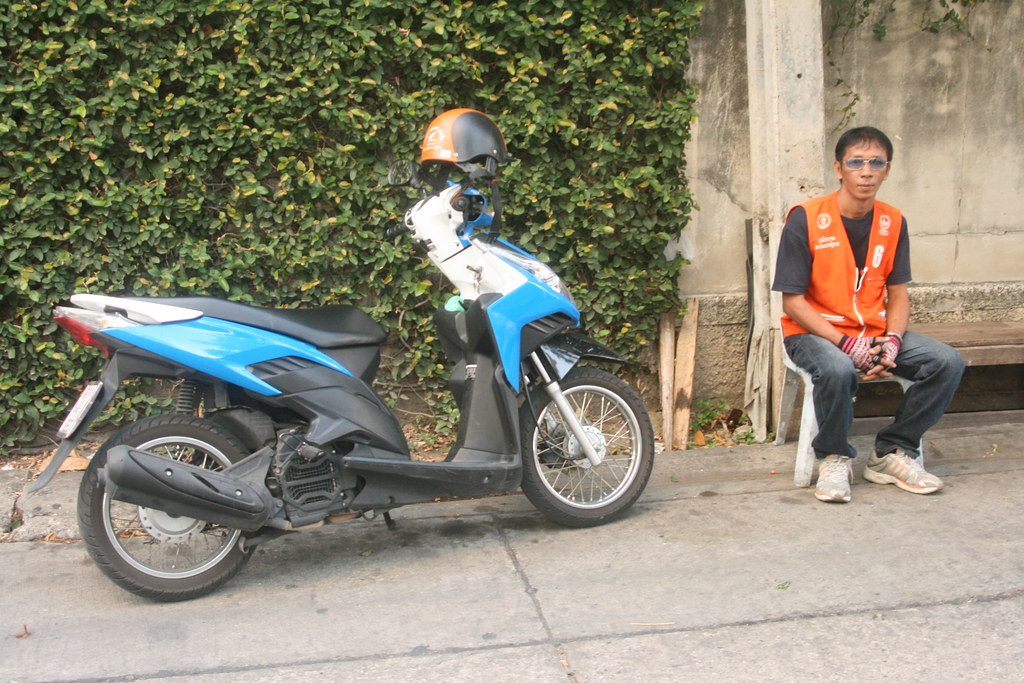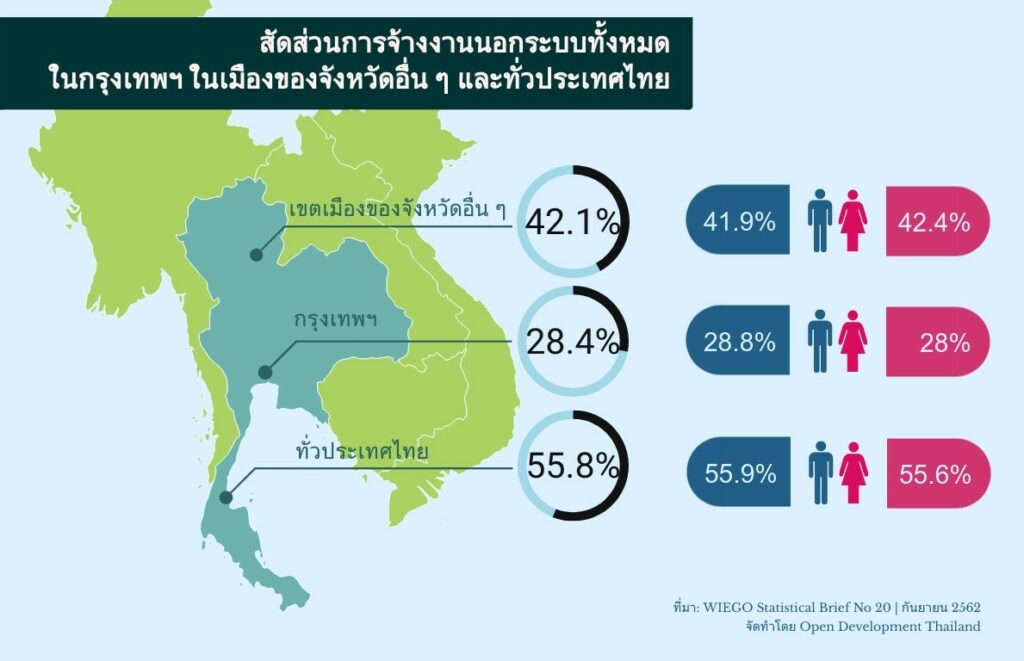การระบาดของ COVID-19 นับเป็นช่วงเวลาท้าทายสำหรับผู้นำประเทศทั่วโลกในการออกมาตรการอย่างมีประสิทธิภาพและทันท่วงที เพื่อลดผลกระทบของ COVID-19 ในขณะเดียวกันก็แจ้งให้ประชาชนรับทราบอย่างต่อเนื่อง อันที่จริงแล้ว COVID-19 ทำให้ความไม่เท่าเทียมทวีความรุนแรงขึ้น และทำให้การเติบโตของรายได้ทั่วโลกต้องหยุดชะงักในช่วงครึ่งแรกของปี 2563
ประเทศไทยเริ่มใช้มาตรการปิดพื้นที่หรือล็อกดาวน์ตั้งแต่กลางเดือนมีนาคมจนถึงเดือนมิถุนายน 2563 จากข้อมูลกำลังแรงงานของสำนักงานสถิติแห่งชาติ (สช.) มาตรการต่าง ๆ ที่ประกาศใช้เพื่อควบคุมการระบาดของ COVID-19 ได้ส่งผลกระทบอย่างมากต่อการจ้างงานและคนทำงานในไตรมาสที่ 2 ของปี 2563
ดูเพิ่มเติม แดชบอร์ด: โควิด-19 และตลาดแรงงาน
ปัญหาการว่างงานเริ่มเป็นที่กังวล เมื่อข้อมูลจาก สช. แสดงให้เห็นถึงอัตราว่างงานที่เพิ่มสูงถึงร้อยละ 2 ในช่วงไตรมาสที่ 2 ของปี 2563 โดยในช่วงทศวรรษที่ผ่านมา การว่างงานของไทยอยู่ในอัตราร้อยละ 0.61 ทางสำนักงานสภาพัฒนาการเศรษฐกิจและสังคมแห่งชาติ (สศช.) คาดว่ามีแรงงานที่เสี่ยงถูกเลิกจ้าง 8.4 ล้านคน จากการระบาดของโควิด-19 ในไตรมาสที่ 2 และ 3 ของปี 2563 ทั้งนี้ไม่รวมเกษตรกรกว่าหกล้านคนที่ได้รับผลกระทบจากภัยแล้งแล้ว2 ภาคส่วนสำคัญของไทยได้รับกระทบอย่างหนัก รายงานขององค์การแรงงานระหว่างประเทศ (ILO) คาดการณ์ว่าคนงานในภาคการท่องเที่ยวของไทยยกว่าหกล้านคนขึ้นไปจะตกงาน เนื่องจากการท่องเที่ยวได้รับผลกระทบอย่างมากจากมาตรการควบคุมการแพร่ระบาดและการเว้นระยะห่างทางสังคม3
ผลกระทบจาก COVID-19 ต่อแรงงานแต่ละภาคธุรกิจมีความรุนแรงที่ไม่เท่ากัน ทางสมาพันธ์แรงงานนอกระบบในประเทศไทย (FIT) รายงานว่า ธุรกิจขนาดเล็กมีรายได้เพียงร้อยละ 20 หรือน้อยกว่านั้นของรายได้ก่อนการระบาด COVID-19 มีหลายธุรกิจต้องลดชั่วโมงทำงาน หรือให้พนักงานทำงานจากที่บ้าน และมีแรงงานจำนวนหนึ่งที่เผชิญกับสภาวะตกงานโดยสิ้นเชิง4 ทั้งนี้ คนที่ทำงานอยู่ในการจ้างงานนอกระบบที่มีความเสี่ยงอยู่แล้วยิ่งได้รับผลกระทบจาก COVID-19 มากขึ้นอีก
ความเปราะบางของงานนอกระบบ
แรงงานนอกระบบ หมายถึง ผู้มีงานทำที่ไม่ได้รับความคุ้มครองภายใต้โครงการประกันสังคมเช่นเดียวกับแรงงานในระบบ มีสัดส่วนมากกว่าครึ่งหนึ่งของการจ้างงานในประเทศไทยหรือคิดเป็นมากกว่า 20 ล้านคน5 แรงงานนอกระบบในประเทศไทยส่วนใหญ่หมายถึงคนที่ประกอบธุรกิจครัวเรือน หรือธุรกิจส่วนตัว ได้รับค่าจ้างรายวัน หรือทำงานมีสัญญาที่ไม่รวมความคุ้มครองตามหลักประกันสังคม6 บางครั้งเราจะได้ยินคำเรียก การจ้างงานนอกระบบว่า “กิ๊ก” (มาจากคำว่า “Gig”) ซึ่งหมายถึง คนทำงานฟรีแลนซ์ ลูกจ้างชั่วคราวที่ได้รับค่าตอบแทนรายครั้งหรือระยะสั้น อาชีพเหล่านี้มีมากมาย รวมถึงเกษตรกร คนขายของริมถนน คนงานก่อสร้าง มอเตอร์ไซค์รับจ้าง เป็นต้น7 จำนวนแรงงานนอกระบบที่เพิ่มขึ้นถือเป็นประเด็นสังคมเมือง โดยเฉพาะอย่างยิ่งมีแอปพลิเคชันออนไลน์ที่รองรับการทำงานนอกระบบนี้เพิ่มขึ้น สังคมเมืองของไทยก้าวสู่ยุคดิจิทัลมากขึ้น โดยมีแรงงานนอกระบบคิดเป็นประมาณร้อยละ 28 ของการจ้างงานในกรุงเทพฯ และคิดเป็นร้อยละ 42 ของเมืองหลักอื่น ๆ ในไทย8
โดยปกติในช่วงเศรษฐกิจตกต่ำ งานนอกระบบเป็นทางออกชดเชยการสูญเสียงานประจำ ช่วยให้แรงงานสามารถสร้างรายได้ของตัวเอง และลดการพึ่งพาเงินพิเศษจากภาครัฐ แต่มาตรการด้าน COVID-19 ส่งผลกระทบต่อกลุ่มงานนอกระบบอย่างหนักหน่วง การสูญเสียรายได้ของแรงงานนอกระบบจะผลักดันให้คนจำนวนมากเข้าเกณฑ์กลุ่มที่มีรายได้น้อย หรือใต้เกณฑ์ความยากจนสากล (คือมีรายได้ขั้นต่ำน้อยกว่า 1.90 ดอลลาร์สหรัฐ หรือประมาณ 60 บาทต่อวัน) มีการประเมินว่าสัดส่วนของคนยากจนในประเทศไทยจะเพิ่มขึ้นจากร้อยละ 4.7 เป็นร้อยละ 11 ของการจ้างงานทั้งหมดในปีนี้9 โดยเฉพาะอย่างยิ่ง มาตรการล็อกดาวน์ได้ส่งผลกระทบต่อผู้ค้าปลีกและผู้ค้ารายย่อย การลดลงของภาคการท่องเที่ยวและภาคการผลิตยิ่งส่งผลให้งานนอกระบบที่พึ่งพิงภาคส่วนเหล่านี้ ไม่ว่าจะเป็นพนักงานขับรถส่งของ และผู้ค้าขายริมถนน ต้องซบเซาลงไปด้วย
ผลกระทบต่อสวัสดิการครัวเรือนยังมีแนวโน้มรุนแรงขึ้น โดยคาดการณ์ว่าในปี 2563 คนที่มีรายได้น้อยถึงปานกลางขาดความมั่นคงทางเศรษฐกิจ เช่น ผู้ที่มีรายได้ต่ำกว่า 5.5 ดอลลาร์สหรัฐต่อวัน จะมีจำนวนเพิ่มขึ้นเป็นสองเท่าจาก 4.7 ล้านคนในไตรมาสที่ 1 เป็น 9.7 ล้านคนในไตรมาสที่ 2 และจะสถานการณ์จะฟื้นตัวเล็กน้อยเป็น 7.8 ล้านคนในไตรมาสที่ 310
เศรษฐกิจอาชีพอิสระ (Gig Economy) ของไทย
ในขณะที่เศรษฐกิจอาชีพอิสระ หรือ Gig Economy ไม่ใช่เรื่องใหม่ แต่เร็ว ๆ นี้เศรษฐกิจอาชีพอิสระได้รับการกล่าวขานอีกครั้ง เนื่องด้วยพฤติกรรมผู้บริโภคแบบ “ปกติวิถีใหม่” และการเกิดขึ้นของแอปพลิเคชันออนไลน์ยี่ห้อต่าง ๆ สำหรับให้บริการตามเงื่อนไขการว่าจ้าง ในปัจจุบันมีแอปพลิเคชันมากมาย เช่น LINE, Grab, Food Panda, Gojek และ Get เป็นต้น ที่พัฒนาเป็นแพลตฟอร์มศูนย์รวมให้ผู้ใช้สั่งอาหารจากร้านอาหารที่หลากหลาย ไม่ว่าจะเป็นแฟรนไชส์ขนาดใหญ่หรือแผงลอยริมถนน การส่งอาหารแต่ละครั้งจะทำโดยผู้ขับขี่ที่ไร้สัญญา แต่ยินดีรับงาน “อิสระ” หรือ “Gig” ผ่านแอปพลิเคชันและมีรายได้ต่อเที่ยว โดยมีระบบคล้ายกับมอเตอร์ไซค์รับจ้าง
นับเป็นเรื่องยากที่จะนำเสนอตัวเลขการจ้างงานที่ชัดเจนและถูกต้องของเศรษฐกิจอาชีพอิสระ เนื่องจากแอปพลิเคชันส่งอาหารยังไม่ได้อยู่ในความควบคุมของรัฐบาล อีกทั้ง คนทำอาชีพอิสระยังไม่ได้เข้าระบบคุ้มครองภายใต้ประกันสังคม ทั้ง ๆ ที่ภาครัฐพยายามให้คนมีงานทำทุกคนเข้าสู่ระบบประกันสังคมเป็นสิทธิพื้นฐาน
งานวิจัยล่าสุดประเมินว่า รายได้ของผู้ขับขี่ส่งอาหารบนแพลตฟอร์มอยู่ระหว่าง 15,000 ถึง 40,000 บาทต่อเดือน โดยมีแรงจูงใจให้ขับขี่ส่งอาหารให้มากที่สุดและเพิ่มเวลาทำงาน เพื่อรายได้ที่สูงขึ้น รายได้ของผู้ขับขี่ไม่แน่นอนเพราะเป็นค่าตอบแทนรายครั้ง โดยไม่มีหลักประกันในการทำงานหรือสวัสดิการแรงงานขั้นต่ำ11
ด้วยความไม่แน่นอนของอาชีพอิสระ คนขี่มอเตอร์ไซค์รับจ้างมักได้รับผลกระทบหนักที่สุดจากมาตรการป้องกันโรคระบาด และอาจเผชิญกับผลกระทบที่ยืดเยื้อได้ ทั้งนี้ การจำกัดการเดินทางในช่วงการระบาดได้เพิ่มโอกาสให้เกิดการส่งอาหารตามความต้องการในรูปแบบ “ปกติวิถีใหม่” ซึ่งนับเป็นตลาดที่สมบูรณ์พร้อมให้บริการ ผู้บริโภคที่ถูกกักบริเวณ ไม่สามารถรับประทานอาหารภายในร้านได้ สามารถทำได้แค่ซื้ออาหารกลับบ้านหรือสั่งผ่านทางแพลตฟอร์มจัดส่งอาหารเท่านั้น อย่างไรก็ตาม คนขี่มอเตอร์ไซค์รับจ้างมีความเสี่ยงได้รับเชื้อไวรัส ซึ่งเป็นภัยคุกคามต่อสุขภาพส่วนบุคคล อาชีพขี่มอเตอร์ไซค์รับจ้างจึงได้รับผลกระทบอย่างมากเพราะความจำเป็นในการเดินทางลดลง ผู้โดยสารปกติเริ่มทำงานจากบ้านเพื่อรักษาระยะห่างทางสังคม

อาชีพขับขี่มอเตอร์ไซค์รับจ้างในประเทศไทย โดย ibeeckmans | CC Search ภายใต้ CC BY-NC-SA 2.0.
ต้นแบบเศรษฐกิจสมานฉันท์: ตามสั่ง-ตามส่ง
หนึ่งตัวอย่างจากอาจารย์จากจุฬาลงกรณ์มหาวิทยาลัยร่วมกับสำนักงานกองทุนสนับสนุนการสร้างเสริมสุขภาพ (สสส.) พัฒนาแพลตฟอร์มชุมชนที่มีชื่อว่า “ตามสั่ง-ตามส่ง” เพื่อรับมือกับความท้าทายความมั่นคงด้านอาชีพให้กับคนขี่มอเตอร์ไซค์รับจ้างและคนขายอาหาร อีกทั้งเพื่อดำเนินกาตามมาตรการเว้นระยะห่างทางสังคม
การริเริ่มเปิดตัวแพลตฟอร์มส่งอาหาร “ตามสั่ง-ตามส่ง” เกิดขึ้นเพื่อช่วยเหลือชุมชนในย่านลาดพร้าว 101 กรุงเทพฯ โดยตั้งใจเสริมสร้างคุณภาพชีวิตที่ดีอย่างสมานฉันท์ของชุมชน ด้วยการช่วยเหลือผู้ขายอาหาร คนขี่มอเตอร์ไซค์รับจ้าง และลูกค้าให้ปรับตัวเข้าสู่เศรษฐกิจแบบแพลตฟอร์มได้
โมเดลนี้พัฒนาด้วยกรอบแนวคิดของเศรษฐกิจสมานฉันท์ สามารถช่วยเพิ่มความมั่นคงในอาชีพและเสริมสร้างศักยภาพให้กับชุมชน แม้ว่ามาตรการเว้นระยะห่างจะยกเลิกแล้วก็ตาม ปัจจุบัน มีผู้ประกอบการขายอาหารกว่า 60 ราย และคนขี่มอเตอร์ไซค์รับจ้าง 34 รายเข้าร่วมเป็นสมาชิกบนแพลตฟอร์ม ขั้นต่อไป ผู้พัฒนามุ่งหวังให้ชุมชนผู้ประกอบการและคนขี่มอเตอร์ไซค์รับจ้างย่านลาดพร้าว 101 ได้ใช้และร่วมพัฒนาให้แพลตฟอร์มนี้ยั่งยืน12
References
- 1. เอเชียไทม์. 29 พฤษภาคม 2563. การว่างงานจำนวนมากเป็นความปกติใหม่ของภูมิภาคเอเชียตะวันออกเฉียงใต้. เข้าถึงเดือนสิงหาคม 2563.
- 2. ธนาคารเพื่อการบูรณะและพัฒนาระหว่างประเทศ และธนาคารโลก. 2563. ติดตามเศรษฐกิจไทย: ประเทศไทยในยุค COVID-19. เข้าถึงเดือนสิงหาคม 2563.
- 3. องค์การแรงงานระหว่างประเทศ. 2563. บทสรุปและข้อเสนอแนะของ ILO: ผลกระทบของ COVID-19 ต่อการจ้างงานและตลาดแรงงานในประเทศไทย. เข้าถึงเดือนสิงหาคม 2563.
- 4. อ้างแล้ว.
- 5. อ้างแล้ว.
- 6. อ้างแล้ว.
- 7. บางกอกโพสต์. 1 พฤษภาคม 2563. วิกฤตคนทำงาน. เข้าถึงเดือนสิงหาคม 2563.
- 8. Women in Informal Employment Globalizing and Organizing. 2562. WIEGO Statistical Brief No 20: Informal Workers in Urban Thailand: A Statistical Snapshot. เข้าถึงเดือนกันยายน 2563.
- 9. อ้างแล้ว.
- 10. อ้างแล้ว.
- 11. Just Economy and Labour Institute (JELI). 14 กรกฎาคม 2563. Solidarity in precarity: food delivery riders in Thailand’s gig economy. เข้าถึงเดือนสิงหาคม 2563.
- 12. Voice TV. 25 มิถุนายน 2563. ‘ขับรถส่งอาหาร’ อาชีพเหมือนเงินดี แต่เหนื่อยแทบขาดใจ-ไร้คนดูแล. เข้าถึงเดือนสิงหาคม 2563.


